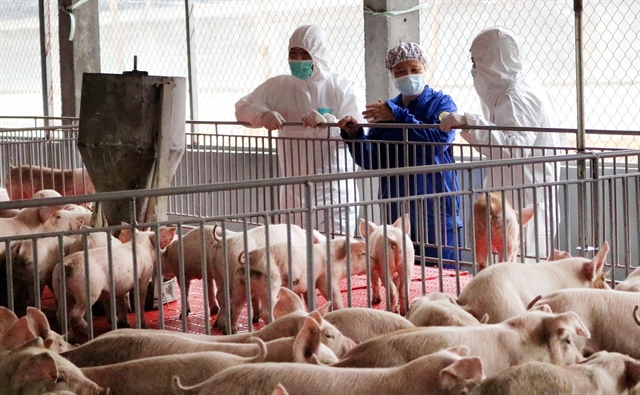 Economy
Economy


|
| A pig farm in Phú Thọ Province. Việt Nam was strengthening pig reproduction with the focus on ensuring biosafety standards. — VNA/VNS Photo Trung Kiên |
HÀ NỘI — Việt Nam imported nearly 25,300 tonnes pork as of March 15, representing a rise of 205 per cent over the same period last year, latest updates from the Ministry of Agriculture and Rural Development showed.
Pork imports aimed to make up for the shortage in supply and cool off skyrocketing pork prices which were caused by the African swine fever.
Pork was mainly imported from Canada (29 per cent), Germany (19 per cent), Poland (12 per cent), Brazil (12 per cent) and the US (5.5 per cent).
Recently, Prime Minister Nguyễn Xuân Phúc asked the agriculture ministry and relevant agencies to implement measures to lower pork prices.
Minister of Agriculture and Rural Development Nguyễn Xuân Cường asked big husbandry companies to reduce live hog price to VNĐ70,000 (US$3).
Pork prices were on a downward trend but remained at high levels in some northern provinces like Hưng Yên, Lào Cai and Phú Thọ, with live hog price at around VNĐ83,000 per kilo for live hog.
If the pork prices were not lowered to the expected levels, Việt Nam would increase imports in an effort to cool off the prices, Deputy Minister of Agriculture and Rural Development Phùng Đức Tiến said.
Russian food supplier Miratorg was expected to export the first batch of pork to Việt Nam at the end of this month.
Việt Nam was strengthening pig reproduction with the focus on ensuring biosafety standards. As a result, pork supply was expected to start to increase from this month.
The Animal Health Department also urged the Ministry of Industry and Trade and relevant agencies to provide support to Vietnamese firms in seeking sources to import pork in the context of the novel coronavirus outbreak which was hindering cross-border trade.
The ministry cited statistics that the global herd of pigs totalled 678 million in January, 12 per cent lower than the same month of 2019.
From the beginning of this year, Việt Nam also increased imports of buffalo meat (with 19,356 tonnes, up by 128 per cent), beef (14,160 tonnes, up 217 per cent) and poultry meat (48,300 tonnes, up by 86 per cent). — VNS




